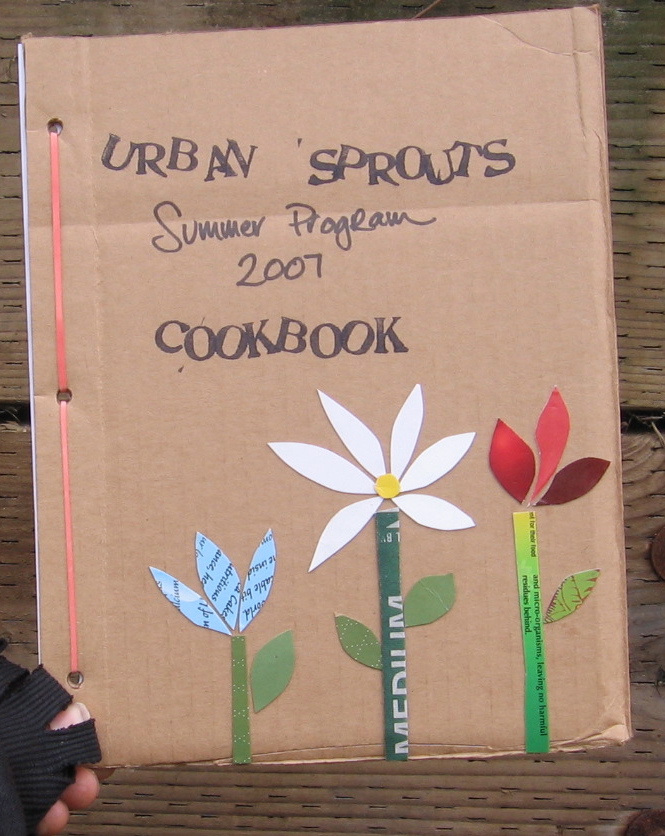During the 2006-2007 school year, Urban Sprouts planned to reach 250 students in the 6th – 12th grades at four San Francisco public schools serving the city’s most under-served neighborhoods.
Urban Sprouts greatly surpassed this goal, reaching a total of 442 students this year. Urban Sprouts partnered with four schools: Excelsior Middle School, Martin Luther King Jr. Academic Middle School, June Jordan School for Equity, and Ida B. Wells Continuation High School. These schools serve San Francisco neighborhoods including the OMI/Excelsior, Sunnydale, Visitacion Valley, Portola, Bayview-Hunters Point, and Western Addition. Of students reached, over 60% were low-income students, 97% were youth of color, and 55% were defined as educationally disadvantaged by the San Francisco Unified School District.
In order to reach Urban Sprouts’ objective of providing hands-on garden-based education for 250 youth, spending at least an hour in the garden each week for 20 weeks, we provided the following activities at our four school sites.
In class Garden-based Education. Over 390 students participated in Urban Sprouts’ core garden-based education program that takes place during science classes. The garden-based classes meet for one hour every other week throughout the school year for a total of 20 hours of participation for every student. Each session is led by the Garden Educator and includes interactive academic learning and garden work. Every student experienced the full process of planting, growing, harvesting and eating crops from the school garden at least three times during the school year. By participating in the entire process, students have strengthened their positive preferences for eating a variety of vegetables.
An additional 28 high school students at June Jordan School for Equity participated in a semester-long elective course focused entirely on sustainable agriculture and food production. This garden-based curriculum included weekly lessons that took place in the school garden, curriculum on nutrition, food production, distribution and marketing, food policy, farm economics, and the environmental impact of agriculture, as well as a field trip to ALBA Organic Farm in Salinas, California.
Garden-based Youth Leadership. We partnered with teachers and students to identify leadership opportunities for smaller groups of 10-15 students, to engage more intensively with the garden and to lead related school-wide activities. These opportunities involved 25 students:
- Excelsior Middle School: Fifteen students in Urban Sprouts’ after school program created, implemented and evaluated a school-wide recycling program. Students led a waste diversion campaign that included posters, a skit, monitoring recycling bins at lunch, and calculating the school’s waste diversion percentage, with support from San Francisco’s Department of the Environment.
- June Jordan School for Equity: Students from the “Food!” elective course at JJSE hosted a meeting with the SFUSD Nutrition and Food Services Director to discuss avenues for improving school lunch at the Jordan/Excelsior campus. A group of parents and students from both schools picked up this effort and will continue to pursue improving school lunch with support from Urban Sprouts during the 2007-2008 school year.
- Salad Days: students at both middle schools harvested, prepared and served school-grown salads to the entire school at lunch;
- Garden Work Parties: students and staff at each school hosted a celebration of garden work, harvesting, cooking, and other activities, attended by students, families, teachers and community members.
New Summer Program. As a result of Urban Sprouts’ cultivation of community partnerships during the year, we developed a new summer opportunity for the youth we serve during the school year. Urban Sprouts partnered with the Garden for the Environment (GFE) to host a two-week summer program for 21 youth, meeting for four hours each day at the GFE. Urban Sprouts trained and supervised 5 high school students who served as staff for the 16 middle school-aged participants. The Summer Program included: daily garden work; an intensive curriculum on gardening, waste diversion, nutrition and sustainable agriculture; daily harvest and preparation of a healthy lunch, and the creation of a culminating event in which youth shared their learning with their families and friends and created take-home actions to apply their learning at home (examples included kits for home recycling, composting, and gardening).
During 2006-07 Urban Sprouts was able to offer more programming to more youth than we originally anticipated. We raised additional funds for the year, a substantial portion from the California Nutrition Network, and were able to hire two additional part-time Garden Educators, Marcus Gallegos and Herman Yee.
Evaluation and Outcomes:
Urban Sprouts’ stated activities included conducting surveys and focus groups to determine the degree of students’ new knowledge, attitudes and behaviors after participating in our programs. Urban Sprouts’ objectives included increases in students’ ecoliteracy, environmental awareness and preferences for consuming fruits and vegetables as a result of participating in our programs.
This spring, Urban Sprouts implemented a survey questionnaire, student focus groups and key informant interviews after completion of our programming. This data is currently being analyzed by Urban Sprouts’ Evaluation Specialist, Michelle M. Ratcliffe, Ph.D. We will share our results on our website as soon as they are complete.
Currently, we have results of Urban Sprouts’ program evaluation conducted by Dr. Ratcliffe from 2004 to 2006 in our middle school programs. We have exciting results to share. Urban Sprouts’ evaluation showed that the garden-based learning experiences:
- Influenced the school’s curricular, physical and social learning environments.
- Affected students’ environment-related skills and knowledge, and attitudes and preferences towards the environment.
- Provided opportunities for students to begin to make sense of the natural world and their relationship to it.
- Influenced students’ social and moral development including strengthening their resiliency traits of pride, patience, hard work, team work, and motivation.
- Influenced students’ willingness to try new foods, decreased their consumption of less nutritious foods, and increased their physical activity level.
- Participating students increased their preferences for a variety of vegetables, the variety of vegetables they eat and how often they eat them.
program evaluation









No comments:
Post a Comment